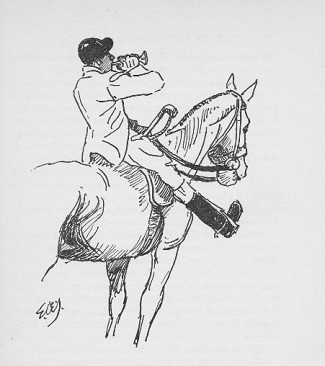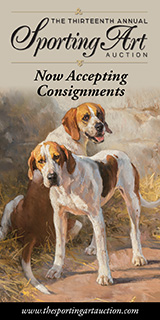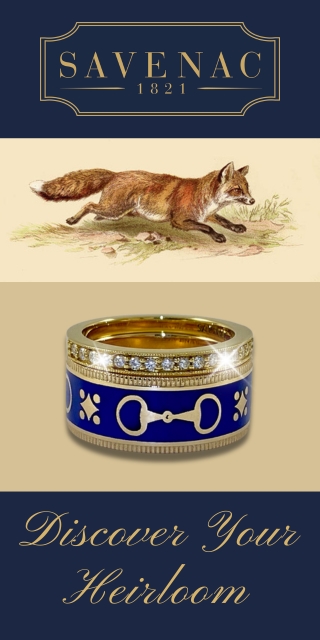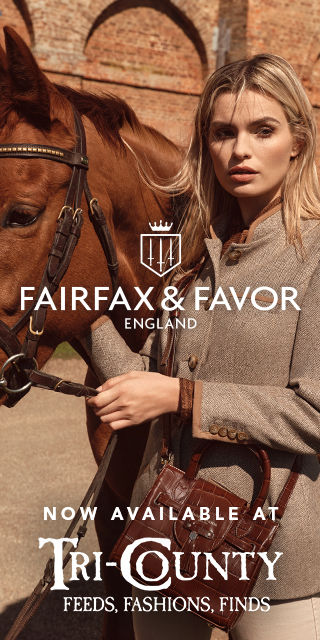 Illustration by Edith SomervilleNow that we all have more reading time on our hands, here is this issue’s Bonus Article to fatten the content for our subscribers and to open more articles, previously restricted, to our non-paying registrants. We’ve been talking about the Irish cousins and author team of Someville and Ross in this issue, so here’s a condensed version of a chapter from Experiences of an Irish R.M. The narrator is Major Sinclair Yeates, the lovable (in the instance of the Somerville and Ross stories) British Resident Magistrate (R.M.) sent to Ireland to adjudicate local disputes in the days before Irish independence in 1922.
Illustration by Edith SomervilleNow that we all have more reading time on our hands, here is this issue’s Bonus Article to fatten the content for our subscribers and to open more articles, previously restricted, to our non-paying registrants. We’ve been talking about the Irish cousins and author team of Someville and Ross in this issue, so here’s a condensed version of a chapter from Experiences of an Irish R.M. The narrator is Major Sinclair Yeates, the lovable (in the instance of the Somerville and Ross stories) British Resident Magistrate (R.M.) sent to Ireland to adjudicate local disputes in the days before Irish independence in 1922.
It is hardly credible that I should have been induced to depart from my usual walk of life by a creature so uninspiring as the grey horse that I bought from Flurry Knox for £25.
I little thought that the result would be that three weeks later I should find myself in a railway carriage at an early hour of a December morning, in company with Flurry and four or five of his clan, journeying towards an unknown town, named Drumcurran, with an appropriate number of horses in boxes behind us and a van full of hounds in front. Mr. Knox’s hounds were on their way, by invitation, to have a day in the country of their neighbours, the Curranhilty Harriers, and with amazing fatuity I had allowed myself to be cajoled into joining the party. A northerly shower was striking in long spikes on the glass of the window, the atmosphere of the carriage was blue with tobacco smoke, and my feet, in a pair of new blucher boots, had sunk into a species of Arctic sleep.
“We’re to go out with the Harriers to-day, and they’ve a sure fox for our hounds to-morrow,” said Flurry. “I tell you you’ll have the best fun ever you had. It’s a great country to ride. Fine honest banks, that you can come racing at anywhere you like.”
Dr. Hickey, a saturnine young man, with a long nose and a black torpedo beard, returned to his pocket the lancet with which he had been trimming his nails.
“They’re like the Tipperary banks,” he said. “You climb down nine feet and you fall the rest.”
It occurred to me that the Quaker and I would most probably fall all the way, but I said nothing.
“I hear Tomsy Flood has a good horse this season,” resumed Flurry.
“Then it’s not the one you sold him,” said the Doctor.
“I’ll take my oath it’s not,” said Flurry with a grin. “I believe he has it in for me still over that one.”
Dr. Jerome’s moustache went up under his nose and showed his white teeth.
“Small blame to him! when you sold him a mare that was wrong of both her hind-legs. Do you know what he did, Major Yeates? The mare was lame going into the fair, and he took the two hind-shoes off her and told poor Flood she kicked them off in the box, and that was why she was going tender, and he was so drunk he believed him.”
The conversation here deepened into trackless obscurities of horse-dealing. I took out my stylograph pen, and finished a letter to Philippa, with a feeling that it would probably be my last.
The next step in the day’s enjoyment consisted in trotting in cavalcade through the streets of Drumcurran, with another northerly shower descending upon us, the mud splashing in my face, and my feet coming torturingly to life. Every man and boy in the town ran with us; the Harriers were somewhere in the tumult ahead, and the Quaker began to pull and hump his back ominously. I arrived at the meet considerably heated, and found myself one of some thirty or forty riders, who, with traps and bicycles and footpeople, were jammed in a narrow, muddy road. We were late, and a move was immediately made across a series of grass fields, all considerately furnished with gates. There was a glacial gleam of sunshine and people began to turn down the collars of their coats. As they spread over the field I observed that Mr. Knox was no longer riding with old Captain Handcock, the Master of the Harriers, but had attached himself to a square-shouldered young lady with effective coils of dark hair and a grey habit. She was riding a fidgety black mare with great decision and a not disagreeable swagger.
It was at about this moment that the hounds began to run, fast and silently, and every one began to canter.
“This is nothing at all,” said Dr. Hickey, thundering alongside of me on a huge young chestnut; “there might have been a hare here last week, or a red herring this morning. I wouldn’t care if we only got what’d warm us..”
I was already getting quite enough to warm me. The Quaker’s respectable grey head had twice disappeared between his forelegs in a brace of most unsettling bucks, and all my experiences at the riding-school at Sandhurst did not prepare me for the sensation of jumping a briary wall with a heavy drop into a lane so narrow that each horse had to turn at right angles as he landed. I did not so turn, but saved myself from entire disgrace by a timely clutch at the mane. We scrambled out of the lane over a pile of stones and furze bushes, and at the end of the next field were confronted by a tall, stone-faced bank. Everyone, always excepting myself, was riding with that furious valour which is so conspicuous when neighbouring hunts meet, and the leading half-dozen charged the obstacle at steeplechase speed. I caught a glimpse of the young lady in the grey habit, sitting square and strong as her mare topped the bank, with Flurry and the redoubtable Mr. Tomsy Flood riding on either hand; I followed in their wake, with a blind confidence in the Quaker, and none at all in myself. He refused it. I suppose it was in token of affection and gratitude that I fell upon his neck; at all events, I had reason to respect his judgment, as, before I had recovered myself, the hounds were straggling back into the field by a gap lower down.
It finally appeared that the hounds could do no more with the line they had been hunting, and we proceeded to jog interminably, I knew not whither. During this unpleasant process Flurry Knox bestowed on me many items of information, chiefly as to the pangs of jealousy he was inflicting on Mr. Flood by his attentions to the lady in the grey habit, Miss “Bobbie” Bennett.
“She’ll have all old Handcock’s money one of these days—she’s his niece, y’ know—and she’s a good girl to ride, but she’s not as young as she was ten years ago. You’d be looking at a chicken a long time before you thought of her! She might take Tomsy some day if she can’t do any better.” He stopped and looked at me with a gleam in his eye. “Come on, and I’ll introduce you to her!”
Before, however, this privilege could be mine, the whole cavalcade was stopped by a series of distant yells, which apparently conveyed information to the hunt, though to me they only suggested a Red Indian scalping his enemy. The yells travelled rapidly nearer, and a young man with a scarlet face and a long stick sprang upon the fence, and explained that he and Patsy Lorry were after chasing a hare two miles down out of the hill above, and ne’er a dog nor a one with them but themselves, and she was lying, beat out, under a bush, and Patsy Lorry was minding her until the hounds would come. I had a vision of the humane Patsy Lorry fanning the hare with his hat, but apparently nobody else found the fact unusual. The hounds were hurried into the fields, the hare was again spurred into action, and I was again confronted with the responsibilities of the chase. After the first five minutes I had discovered several facts about the Quaker. If the bank was above a certain height he refused it irrevocably, if it accorded with his ideas he got his forelegs over and ploughed through the rest of it on his stifle-joints, or, if a gripe made this inexpedient, he remained poised on top till the fabric crumbled under his weight. In the case of walls he butted them down with his knees, or squandered them with his hind-legs. These operations took time, and the leaders of the hunt streamed farther and farther away over the crest of a hill, while the Quaker pursued at the equable gallop of a horse in the Bayeux Tapestry.
I began to perceive that I had been adopted as a pioneer by a small band of followers, who, as one of their number candidly explained “liked to have some one ahead of them to soften the banks,” and accordingly waited respectfully till the Quaker had made the rough places smooth, and taken the raw edge off the walls. They, in their turn, showed me alternative routes when the obstacle proved above the Quaker’s limit; thus, in ignoble confederacy, I and the offscourings of the Curranhilty hunt pursued our way across some four miles of country. When at length we parted it was with extreme regret on both sides. A river crossed our course, with boggy banks pitted deep with the hoof-marks of our forerunners; I suggested it to the Quaker, and discovered that Nature had not in vain endued him with the hindquarters of the hippopotamus. I presume the others had jumped it; the Quaker, with abysmal flounderings, walked through and heaved himself to safety on the farther bank. It was the dividing of the ways. My friendly company turned aside as one man, and I was left with the world before me, and no guide save the hoof-marks in the grass. These presently led me to a road, on the other side of which was a bank, that was at once added to the Quaker’s black list. The rain had again begun to fall heavily, and was soaking in about my elbows; I suddenly asked myself why, in Heaven’s name, I should go any farther. No adequate reason occurred to me, and I turned in what I believed to be the direction of Drumcurran.
I rode on for possibly two or three miles without seeing a human being, until, from the top of a hill I descried a solitary lady rider. I started in pursuit. The rain kept blurring my eye-glass, but it seemed to me that the rider was a schoolgirl with hair hanging down her back, and that her horse was a trifle lame. I pressed on to ask my way, and discovered that I had been privileged to overtake no less a person than Miss Bobbie Bennett.
My question as to the route led to information of a varied character. Miss Bennett was going that way herself; her mare had given her what she called “a toss and a half,” whereby she had strained her arm and the mare her shoulder, her habit had been torn, and she had lost all her hairpins.
“I’m an awful object,” she concluded; “my hair’s the plague of my life out hunting! I declare I wish to goodness I was bald!”
I struggled to the level of the occasion with an appropriate protest. She had really very brilliant grey eyes, and her complexion was undeniable. Philippa has since explained to me that it is a mere male fallacy that any woman can look well with her hair down her back, but I have always maintained that Miss Bobbie Bennett, with the rain glistening on her dark tresses, looked uncommonly well.
“I shall never get it dry for the dance to-night,” she complained.
“I wish I could help you,” said I.
There were fifteen riders in the group that overtook us, and fourteen of them, including the Whip, were grinning from ear to ear; the fifteenth was Mr. Tomsy Flood, and he showed no sign of appreciation. He shoved his horse past me and up to Miss Bennett, his red moustache bristling, truculence in every outline of his heavy shoulders. His green coat was muddy, and his hat had a cave in it. Things had apparently gone ill with him.
Flurry’s witticisms held out for about two miles and a half; I do not give them, because they were not amusing, but they all dealt ultimately with the animosity that I, in common with himself, should henceforth have to fear from Mr. Flood.
“Oh, he’s a holy terror!” he said conclusively; “he was riding the tails off the hounds to-day to best me. He was near killing me twice. We had some words about it, I can tell you. I very near took my whip to him. Such a bull-rider of a fellow I never saw! He wouldn’t so much as stop to catch Bobbie Bennett’s horse when I picked her up, he was riding so jealous. His own girl, mind you! And such a crumpler as she got too! I declare she knocked a groan out of the road when she struck it!”
“She doesn’t seem so much hurt?” I said.
“Hurt!” said Flurry, flicking casually at a hound. “You couldn’t hurt that one unless you took a hatchet to her!”
Posted April 20, 2020
The foregoing is an excerpt from the chapter. What follows is the evening ball, during which Flurry and our narrator, Major Yeates, R.M., provoke Tomsy Flood even further by dancing overly much with Bobbie Bennett. Tomsy decides to secretly feed Flurry’s hounds with the fetid remains of a dead mule in the morning before hunting, but his plot is discovered in time for the visitors to move, equally secretly, the pack of hounds to Tomsy’s bedroom. Before committing this final indignity, Flurry has the good grace to whisper to our narrator, “This isn’t an R.M.’s job; you’d best keep clear of house-breaking,” and closes the gate in Major Yeates’s face. Only in Ireland!

















